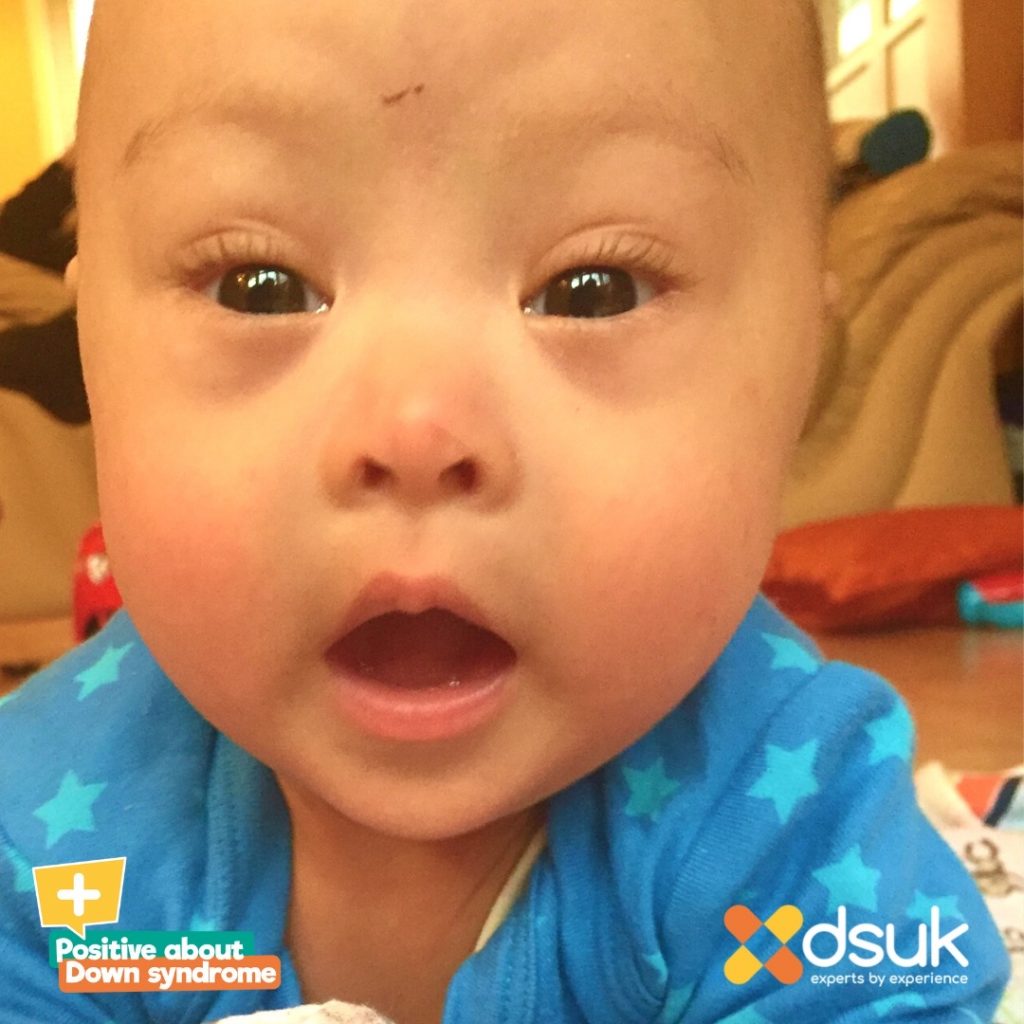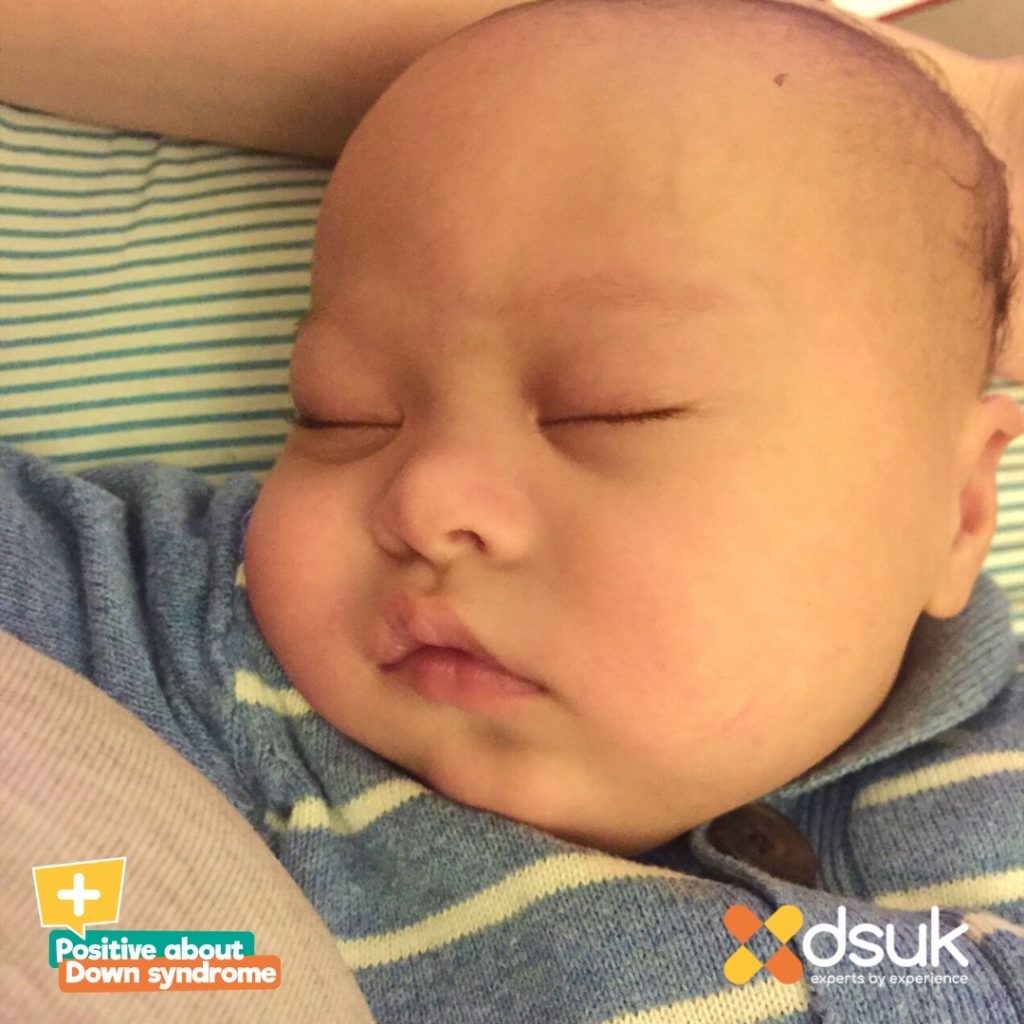Whether you have received a post-natal diagnosis or are pregnant with a pre-natal diagnosis, it can be a time filled with worries and uncertainties. We can help guide you through this time and offer information and support.
I’m Sarah, the breastfeeding coordinator at Positive about Down Syndrome. I’m also mother to a 5-year-old son who has Down syndrome. We found out during our pregnancy that he had Down syndrome and breastfeeding was one of the things I really worried about.
There are so many benefits in breastfeeding and these can apply even more so to babies with Down syndrome. Breast milk can boost your babies immune system and there is some evidence that the act of breastfeeding itself may strengthen your baby’s tongue, lips and face which may help with future speech development.
Babies with Down syndrome can breastfeed

Medical complexities, low muscle tone and lack of suck, swallow, breathe co-ordination are some of the additional challenges facing babies with Down syndrome.
Sadly there is a myth that babies with Down syndrome cannot breastfeed. I’ve heard many stories of people not being supported or being told their baby won’t breastfeed so not to bother trying by various healthcare professionals.
Whilst it’s absolutely possible for many babies with Down syndrome to breastfeed efficiently and successfully, there are some factors that may arise which can impact on establishing feeding. Medical complexities, low muscle tone and lack of suck, swallow, breathe co-ordination are some of the additional challenges facing babies with Down syndrome. As a result some mums will breastfeed with expressed breastmilk from a bottle/tube and others will move onto formula milk.
Support is key
I have been a breastfeeding helper with the BFN (the Breastfeeding Network) for around 6 years and Zephaniah, my baby with Down syndrome, is my second breastfed baby.
During my pregnancy I was thankfully surrounded by wonderfully supportive people who reassured me that it would be hopefully be possible! We had a slightly rocky start and I had to express almost exclusively for the first 3 weeks whilst bottle feeding and using an ng tube whilst we were in the special care unit and in the first week or so at home. However, within a couple of weeks of being home we were exclusively breastfeeding. Zephaniah breastfed until he was 2.5 years.
10 tips for breastfeeding a baby with Down Syndrome
Here are some tips that can help when establishing breastfeeding your baby with Down syndrome
1. Find your support during pregnancy
This is so important when pregnant with any baby. It’s something I learnt in hindsight after I had my first baby. The immediate post-natal period can leave people feeling vulnerable, emotional, hormonal, physically in pain and sometimes the thought of trying to seek out where you can get support from can feel overwhelming.
During pregnancy pop along to your local breastfeeding support group or La Leche League meeting and have a chat. Ask what support is available in hospital in the immediate post-natal period. Have the breastfeeding helpline numbers to hand.
2. Colostrum harvesting
Speak to your midwife about harvesting some colostrum in the last few weeks of pregnancy. This is expressing and collecting colostrum. They can show you a correct technique and provide you with syringes to collect the drops in. This will be beneficial in the early hours/days if your baby struggles to latch straight away or needs expressed milk/supplementation.
Speak to your midwife about harvesting some colostrum in the last few weeks of pregnancy.
3. Donor Milk Policies
Talk to your hospital about their policies and availability of donor milk/milk bank if this is something you would prefer your baby to have over formula should you be required to supplement your baby with milk. Hospitals have different guidelines that they follow so if you have something in place with them it will make things easier when the time comes.
4. Be prepared to pump
There are many reasons you may need to express breastmilk for your baby. It could be that your baby is struggling to latch or it could be due to a nicu/scbu stay, or baby being too sleepy to feed. If your baby has a heart condition or other medical issues going on then they might tire easily. Whilst you are in hospital you should be able to access a good hospital grade double pump.
There are some companies that hire out hospital grade pumps at home or you can use a high street brand electric or manual pump. Some babies with Down syndrome will breastfeed with no problems from the beginning, others, like any baby, may take longer to establish effective, successful feeding. Some mums will decide to pump exclusively for their babies for whatever timeframe they choose to. I pumped for around 3 weeks with Zephaniah before he was effectively feeding at the breast. I know a mum who pumped for 5 months before getting her son to feed directly at the breast.

The main additional challenges your baby may face is difficulty latching and feeding due to low muscle tone, taking longer to establish a breathe, suck, swallow routine, being more sleepy or tiring easily.
5. Be wary of the phrase ‘It’s a Down syndrome issue’
We call this medical overshadowing. Don’t assume or allow anyone to dismiss problems you are facing as being ‘a Down syndrome issue’. As a breastfeeding helper I have seen many women with typical babies facing all sorts of difficulties when establishing breastfeeding. Position and attachment, tongue tie, sleepy babies, being pushed into formula top ups, and mis information and awareness of typical newborn behaviour patterns are common reasons for struggling. All of these same things can apply to you and your baby with Down syndrome as well as some additional challenges your babies may face.
The main additional challenges your baby may face is difficulty latching and feeding due to low muscle tone, taking longer to establish a breathe, suck, swallow routine, being more sleepy or tiring easily. If your baby has complex medical issues such as a heart defect or anything else requiring surgery then there may be pressure for your baby to gain a certain amount of weight in a specific timeframe. Sometimes this can make establishing breastfeeding a challenge.
6. Comfort and support
Low muscle tone in a baby can often make the baby feel heavier or floppy and more of a challenge to hold whilst breastfeeding. It’s important for your comfort, and your baby’s, that you are both well supported with good position and attachment. A suitable chair, a supportive breastfeeding pillow or your own cushions can help with this.
Babies with low muscle tone will often brace their feet against something such as the arm of the chair to stabilise themselves. This can lead to arching which can impact on the positioning of the feeding. You may also want to give additional support to the babies head whilst making sure you aren’t restricting their movement.
7. Dancer Hand Position
This is a technique that can assist when a baby has low muscle tone. You start by holding the breast in the C-hold (thumb on top and 4 fingers underneath) but support the breast with only 3 fingers leaving your index finger and thumb free to hold the baby’s cheek on either side, forming a U shape with the baby’s chin in the bottom of the U. This keeps the weight of the breast off the baby’s chin and helps keep the head steady. This can really help your baby to maintain a good latch.
In the early days of feeding Zephaniah he really struggled to maintain a latch. Without adequate chin support he would slip off the latch frequently. I would always have to feed him with a muslin cloth underneath as he leaked so much milk out of his mouth. As he got bigger and stronger so did his latch.
8. Skin to skin
Make lots of time for skin-to-skin contact with your baby. This will help establish your milk supply and raise oxytocin levels. Whether you have a prenatal or post-natal diagnosis, the immediate time after birth can often be traumatic and confusing. Your baby may be in the nicu or scbu where it can sometimes be more of a challenge to easily have skin-to-skin with your baby so it will need to be intentional.
You may be feeling a variety of emotions and some mums may struggle to initially bond with their baby after having a surprise diagnosis. It’s normal to go through a range of emotions. From sadness, to grief, to guilt, to anger and everything else in between. It’s also normal to not feel any negative emotions and have no issues with bonding. Everyone is different and all feelings are normal.

Make lots of time for skin to skin contact with your baby. This will help establish your milk supply and raise oxytocin levels.
9. Weight chart and red book
In the UK all babies are issued with a red book at the hospital which contains medical information and growth charts/developmental information. Make sure you are given the green Down syndrome insert which contains specific weight/growth charts. This is because babies with Down syndrome can grow at a different/slower rate to typical children. Your baby may seem to be on a lower centile on the typical graph which can lead to some health care professionals recommending top-ups of either expressed breast milk or formula when it’s unnecessary.
10. Go easy on yourself and enjoy your baby
Having a baby is a major event in anyone’s life and having a baby with additional needs adds an entirely different dimension on to that. Do what is best for you and your baby. Make informed choices. If you want to breastfeed and are struggling, try and find the right support and be patient as it can take time to establish.
If you are a mum who desperately wanted to breastfeed and have been unable to, know that you did your absolute best for your baby. You are amazing for giving it a go!
We have some resources and publications at Positive About Down Syndrome that may help you here. You can also check out the PADs Facebook here.

















